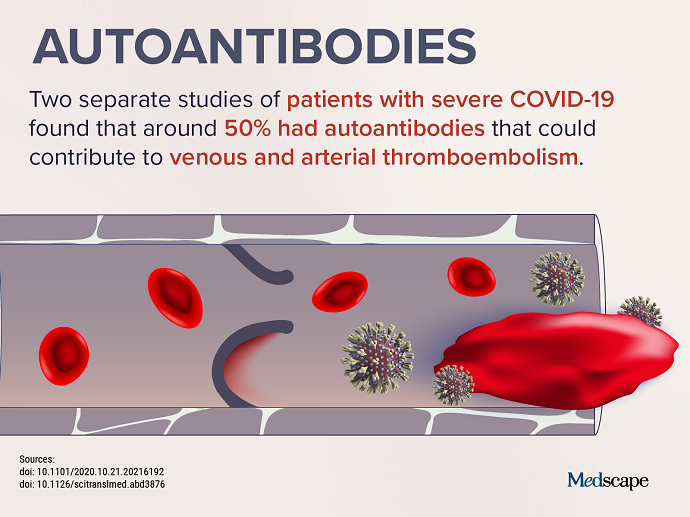Each week, we identify one top search term, speculate about what caused its popularity, and provide an infographic on a related condition. If you have thoughts about what's trending and why, share them with us on Twitter or Facebook. Find the latest COVID-19 news and guidance in Medscape's Coronavirus Resource Center.
New research into how the immune system functions in individuals with severe COVID-19 resulted in autoantibodies becoming this week's top trending clinical topic. A study of 52 patients in Atlanta who had severe or critical COVID-19 and no history of autoimmune disorders found that a significant number had autoantibodies that target human cells instead of the virus (see Infographic below). Among the top 50% of the most severe cases, more than 70% had autoantibodies, some of which were associated with blood clotting and blood flow problems.
A separate study of 172 patients hospitalized with COVID-19 found that 89 patients (52%) tested positive for at least one type of prothrombotic antiphospholipid (aPL) antibody. Investigators from both studies caution that it is too soon to change treatment protocols, but the hope is that these findings can help identify individuals who may benefit from strong anticoagulants. The concern is that if these autoantibodies are long-lasting, they may create chronic issues for patients, in the same way that conditions like lupus function.
These findings support previous research from the National Institutes of Health and other institutions. In a study that looked at about 1000 patients who had severe COVID-19 pneumonia, more than 10% had autoantibodies against interferon when they first became infected. The vast majority (95%) of these were men, who are more likely to get a severe infection, according to other research.
In other antibody news, a study of 480 patients with confirmed COVID-19 seen at an Italian hospital found that neither diabetes nor hyperglycemia appears to impair the antibody response to SARS-CoV-2. Responses against multiple SARS-CoV-2 antigens among the 27% of patients who had both COVID-19 and diabetes (preexisting and newly diagnosed) were similar in terms of timing, titers, and classes to those of patients with COVID-19 who did not have diabetes. The results also did not differ by glucose levels. These findings suggest that a COVID-19 vaccine would be equally as effective in individuals with or without diabetes.
As physicians and researchers work to determine the most effective strategies to prevent COVID-19 and effectively treat those who are severely ill, the immune system will remain a specific area of interest. This week, important findings helped to make autoantibodies the top trending clinical topic.
Read more clinical information about COVID-19.
Medscape © 2020 WebMD, LLC
Any views expressed above are the author's own and do not necessarily reflect the views of WebMD or Medscape.
Cite this: Ryan Syrek. Trending Clinical Topic: Autoantibodies - Medscape - Nov 13, 2020.








Comments